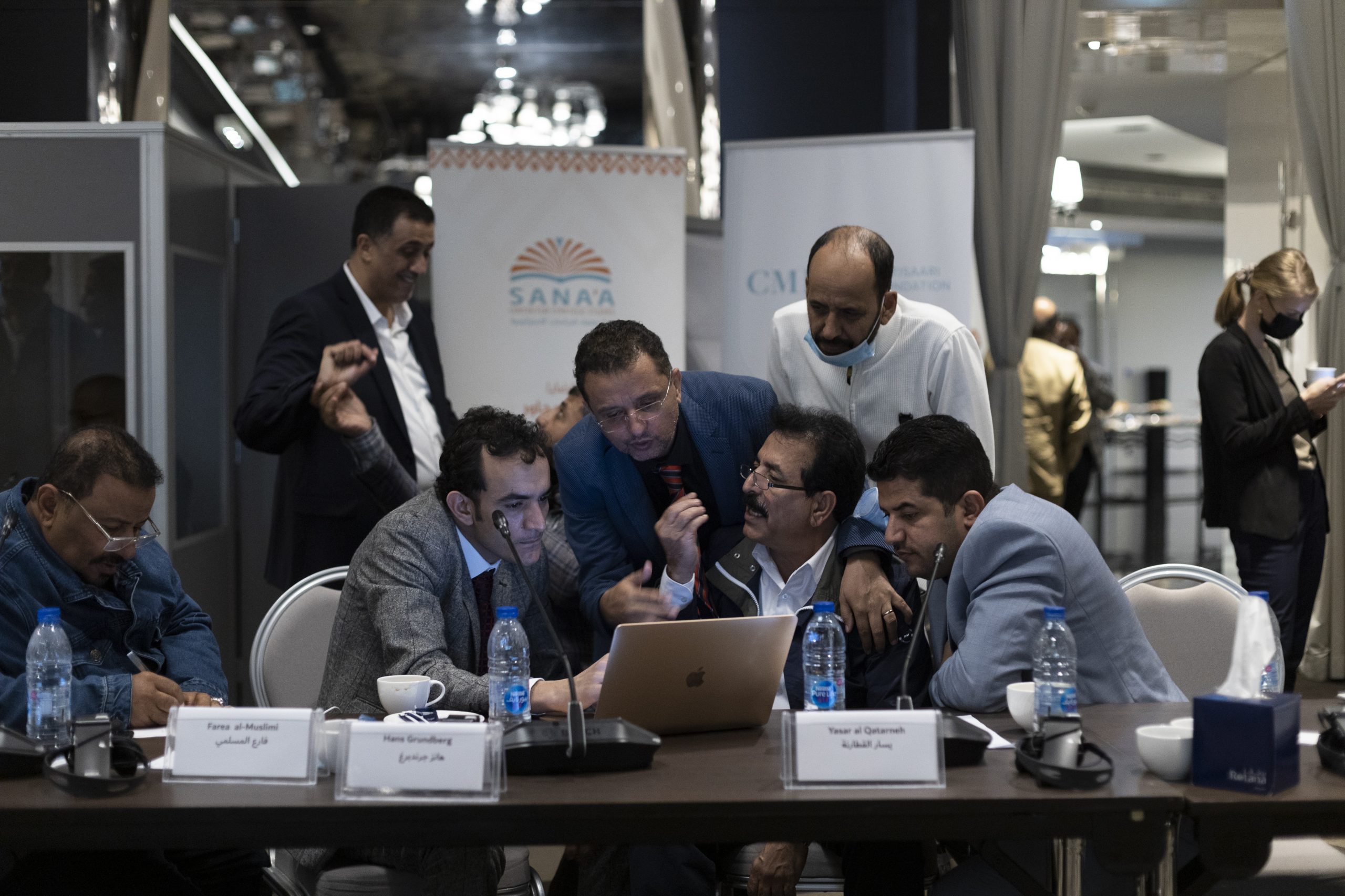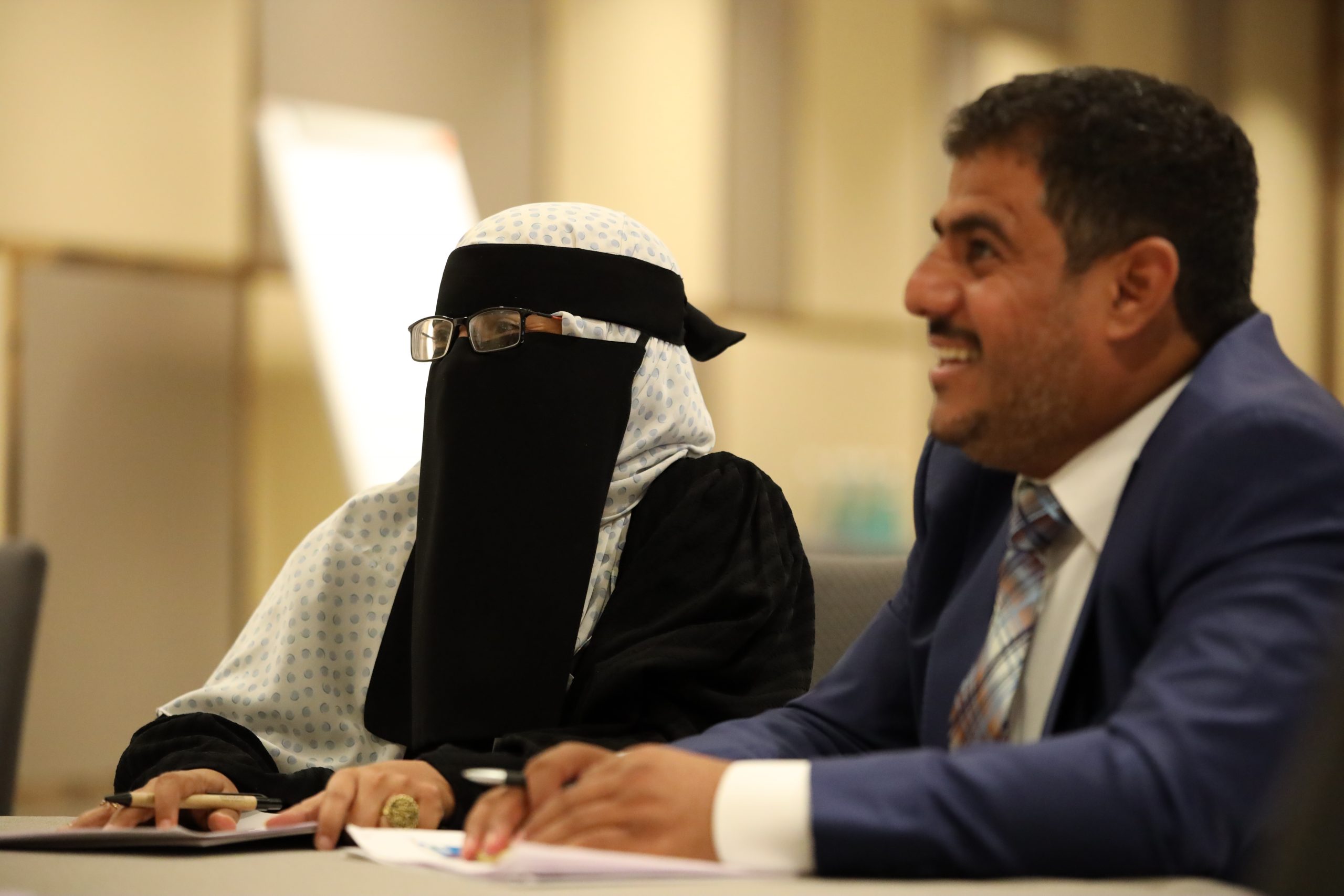New hope for peace in Yemen
The war between the Houthi movement, officially called Ansar Allah, and the government-aligned forces backed by the Saudi-led coalition continues, but there is hope for positive change.

Tribal leaders ratifying the joint statement together with Farae Al-Muslimi of the Sana’a Center for Strategic Studies, Dec 2021. Photo: Maria Santto / CMI
As of end of February 2022, a truce has been agreed between the conflict parties in Yemen, and the Presidential Leadership Council – an interim executive body – has been established. These are two significant achievements that it is hoped will enable a more conducive environment for dialogue, the restart of official peace talks and a permanent ceasefire after nearly eight years of war. CMI has supported the involvement of political parties, tribes and women to bring about sustainable peace. These are all key groups that have been excluded from the main negotiation tables in the official UN led peace process.
Supporting the political parties
The conflict in Yemen has weakened political life and inhibited politics as a peaceful building block of society. CMI has laid the groundwork for renewed Yemeni political party activity and engagement in the peace process by strengthening parties’ internal structures and capacity in addition to fostering dialogue among them.
“We have high hopes in political parties to bring about peace and participate in meetings, consultations and talks to resume political life and political activities during the upcoming transitional period. We hope to establish a stable state with sovereignty that guarantees political pluralism and representation for all”, says Aidah Abdullah, Head of the Women’s Department of the General People’s Congress (GPC) in the Lahj governorate and member of the Permanent Committee.
In practice, support for parties has entailed mapping and addressing their internal needs and challenges to increase the effectiveness of their political work, and to engage the major parties in inter-party dialogue on joint principles for political action and their role in the peace process.
Recent developments in Yemen, with the establishment of a Presidential Leadership Council, an interim executive body, and the two-month truce, agreed separately, offer hope for positive change in the Yemeni conflict. And there is a new momentum for political parties.
Yemen in numbers 2021
20 events
394 participants of which
38% women
“For the first time since the beginning of the war, political parties are meeting and discussing the formation of a new government. This is a new stage in political activities at the national level and in rebuilding the state after the period of war and conflict for the period of peace and reconstruction that leads to permanent and honourable peace”, says Abdullah.
Considering the complexity of the situation and the value of long-term third-party engagement, CMI’s continued work in Yemen is necessary to ensure a sustainable outcome.
Working on inclusive peace
The conflict has further deteriorated the involvement of women in Yemen’s politics. It is essential to establish effective mechanisms for their inclusion in political parties, including through quotas and legislation, to strengthen women’s capacities, and to continue to ensure gender-balanced representation and gender-sensitive language in all initiatives.
“We, as women in political parties, strive for a sustainable peace that would meet the aspirations of all groups, and a peace process that is inclusive of all, men and women. We believe in the return of political life and parties as an alternative to armed conflict”, says Abdullah.
The initiative has also confirmed women’s important role in tribal communities where they play key roles in local level resolution of disputes and peacemaking.
“As women, our role in peacemaking is in helping others realise solutions,” says Hayam Al-Qarmoushi. She and other tribal women are contributing to peace in Yemen by mediating prisoner exchanges and feuds between families.

Naji Murait (left) and Hayam Al-Qarmoushi (right) in Istanbul at a CMI workshop, 2021. Photo: Olli Puumalainen / CMI
Establishing the tribes’ role in mediation
The project has also assisted a unique platform of tribal leaders. The project has also assisted a unique platform of tribal leaders and influential women from tribal communities to further their role in the peace process. Both have a long history of settling disputes and resolving conflicts. Tribal leaders mediated about half of the ceasefires in Yemen between 1989 and 2018. Tribes can play a major role in ending the war, acting as guarantors for local ceasefire agreements, and initiating and overseeing local confidence-building measures such as prisoner exchanges.
“The tribe can be a tool for war or peace, depending on what you decide to do”, says sheikh Naji Murait, who has been one of the most successful mediators of prisoner releases during the war in Yemen. “I urge the other sheikhs not to keep silent at home. They must work on stopping the bloodshed. They must work on ending the war.” In practice, CMI facilitated a series of meetings between influential Yemeni tribal leaders from different governorates. The meetings identified potential roles for tribal representatives to engage in the peace process and achieve a nationwide ceasefire and included a joint statement calling for an end to violence and a restart of the political process.
Scan this QR code to watch “A path to peace: Tribal mediation and the war in Yemen”
This article was published in our Annual Report 2021.
Kreeta Koskijoki / CMI